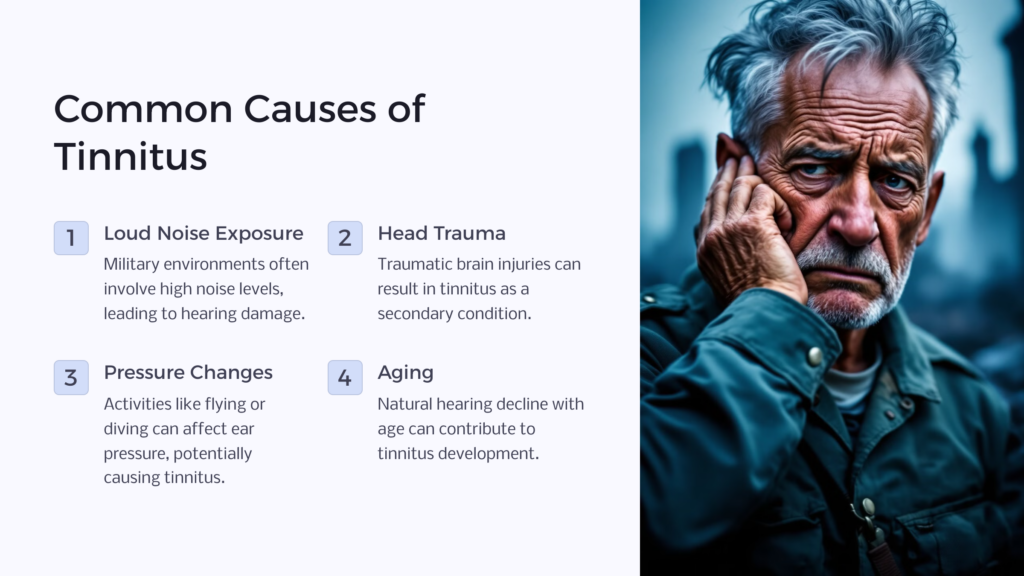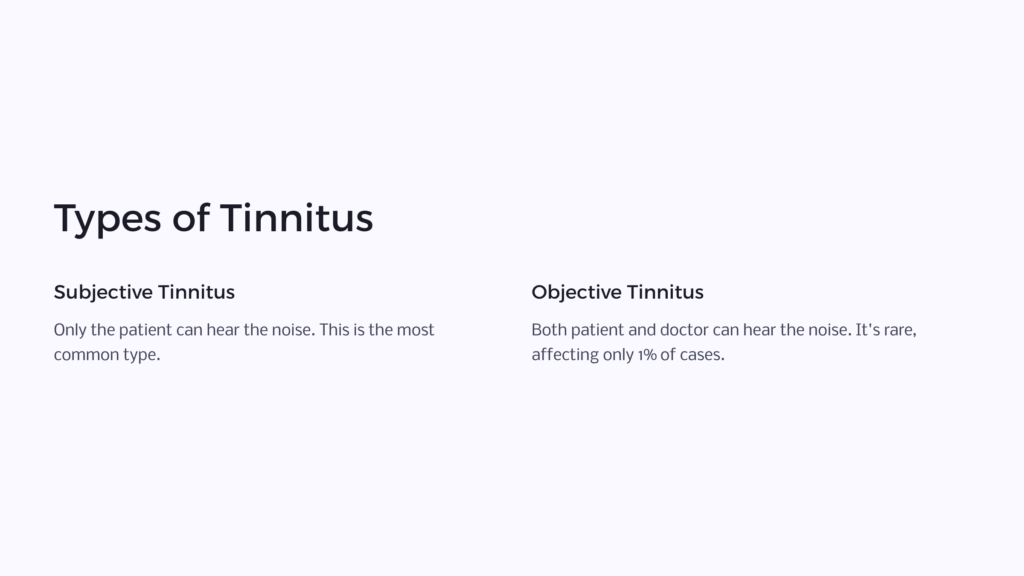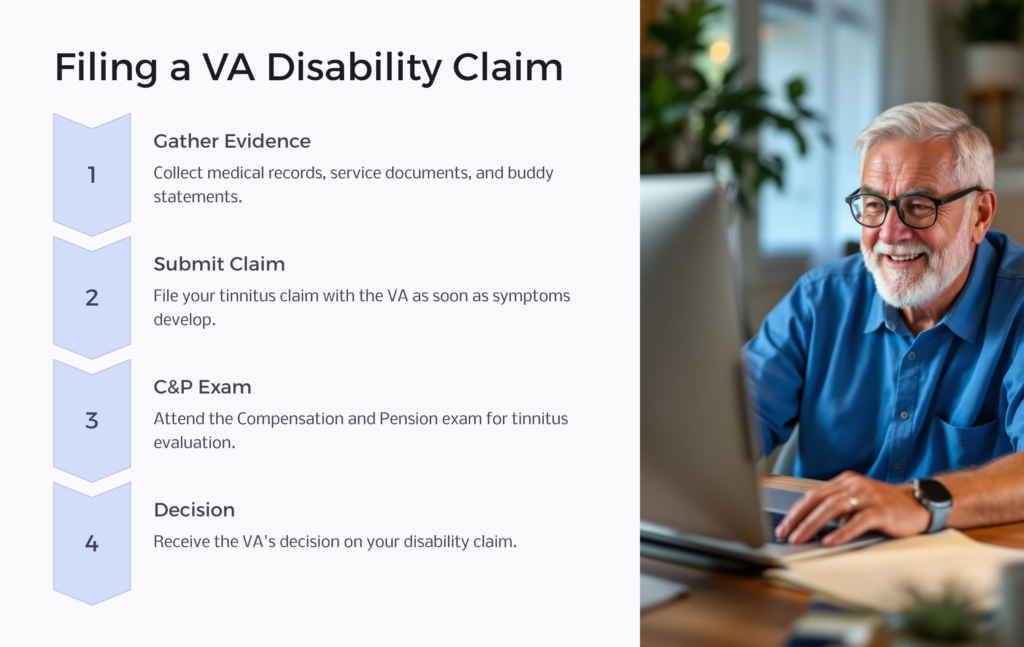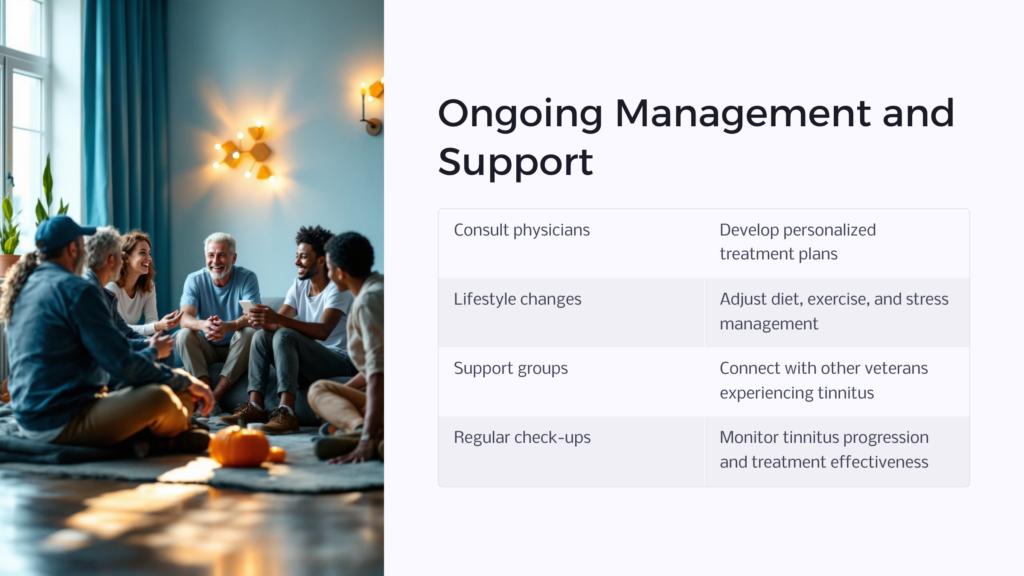Tinnitus is a common condition for many military veterans. Symptoms include a perceived noise in the ear, even though there is no external sound. Tinnitus is often accompanied by hearing loss, and there are a few common causes.
Common Causes of Tinnitus

- Exposure to loud noise
- Head trauma
- Pressure changes
- Secondary to other illness or injury
- Growing Older
For some, tinnitus is a temporary nuisance that goes away in time or through treating another condition. Others experience chronic tinnitus, which can range in intensity from mild to debilitating. Symptoms are often worse at night and other times of quiet when background noise isn’t drowning it out. There is currently no cure for tinnitus, but several treatment options can manage symptoms and help tinnitus patients live a more comfortable life.
Military veterans can receive disability compensation for tinnitus by filing a VA disability claim. If the VA determines that military service caused your tinnitus, you’ll receive a disability rating of 10% for that condition.
What Is Tinnitus?

Tinnitus is a condition that causes a person to hear a sound in their ear even though there is no outside noise. Most people associate ringing in the ear with tinnitus, but other tinnitus symptoms include hissing, buzzing, or whistling in the ear. The intensity of sound can vary significantly. Tinnitus can occur alone or as a symptom of another illness.
There are two types of tinnitus. Subjective tinnitus is when a patient hears a noise in the ear that is not produced by an external source, and only the patient can hear it. The other form, objective tinnitus, happens when the patient hears a noise in the ear that a doctor can hear as well. These sounds are the result of a circulatory system or musculoskeletal system issue. Objective tinnitus only occurs in 1% of patients.
Tinnitus can also lead to other conditions. It is not uncommon for people with tinnitus to experience depression and anxiety because of troubling symptoms. Some studies show that tinnitus can also make patients more susceptible to sleep disturbances such as sleep apnea.
A widespread condition overall, tinnitus affects about 50 million Americans. It is also prevalent in the veteran community, making it the most common disability by the Veterans Administration. Since there are many causes of tinnitus, a veteran must prove service connection to be compensated.
Is There a Cure for Tinnitus?
Presently, there is no cure for tinnitus, although researchers with the American Tinnitus Association are diligently working to find one. There are several treatment options available to patients to manage the condition. For some, tinnitus is temporary and goes away over time.
For people with chronic tinnitus, it does not go away. Those with chronic tinnitus rely on a combination of treatment techniques that can ease the severity of symptoms and lead to a more comfortable life.
Although there is no cure, there are ways to manage tinnitus symptoms. Some treatments reduce ringing to manageable levels or alleviate them entirely. Many patients try a combination of treatments to find what works best for them. Some standard treatment techniques include:
- White noise machines: These devices produce low-level noise that masks the ringing in the ears
- Hearing aids: Improving levels of hearing can reduce ringing
- Masking devices: This is a white noise device worn inside the ear like a hearing aid
- Anti-depressants: Some anti-depressant drugs can help in reducing ringing in the ears
- Acupuncture: This technique is know to alleviate symptoms through pressure points
- Dietary changes: Avoid alcohol, caffeine, and nicotine while increasing zinc and vitamin B
- Stress management: Anxiety is a contributor, so stress management techniques can help relieve tinnitus symptoms
It is helpful for those who suffer from tinnitus to have several tools available to manage their symptoms. Because tinnitus is often secondary to another illness, it is essential to consult your doctor for diagnosis and treatment. Sometimes treating the primary illness will cause the ringing in the ears to stop.
Common Causes of Tinnitus
There is no one definitive factor that doctors can pinpoint as a cause for tinnitus. Several reasons can lead to tinnitus, and below are some of the most common ones.
Exposure to Loud Noise
Noise exposure is a leading cause of hearing loss which also leads to tinnitus. Noise-induced hearing loss is a common complaint from military veterans who spent time in extremely noisy environments. Training on weapons ranges, operating heavy vehicles and machinery, and conducting aircraft operations are everyday situations for those on active duty. Although most service members wear hearing protection, this does not eliminate exposure risks. Many veterans experience some level of hearing loss or tinnitus due to exposure to loud noise.
Head Trauma
Traumatic brain injury (TBI) is another common disability suffered by veterans who have experienced a traumatic injury during combat, often caused by improvised explosive devices (IEDs). For those who suffer from TBI, hearing loss and tinnitus are common secondary conditions. Tinnitus can either be temporary or chronic for TBI veterans.
Pressure Changes
Another possible cause of tinnitus is pressure changes that impact the middle ear. Many outside forces can change the pressure that is inside your ear. Activities like swimming, diving, and flying can cause pressure changes. Being at a higher elevation than you are used to also causes pressure changes. Veterans with TBI have often experienced percussive explosions that cause a severe change of pressure in the ear.
Internal factors also cause an increase in ear pressure, like circulatory problems, sinus infections, and the common cold.
Secondary to Other Illness or Injury
If you are experiencing tinnitus, it may be because of another illness or injury that you have. Tinnitus often occurs alongside hearing loss, so any condition that can lead to hearing loss can result in tinnitus. Any head or neck injury that damages nerves in the area may lead to tinnitus also.
Peripheral vestibular disorder, a condition that causes vertigo, can cause a ringing in the ear. Another similar inner ear disease called Meniere’s disease may also contribute to tinnitus. Along with inner ear problems, a circulatory condition that changes blood flow around the ears could be to blame for ringing.
Lastly, mental health conditions such as depression and anxiety often lead to tinnitus. Mental health problems can result in all sorts of symptoms in the body due to the balance of mind and body on overall wellness.
For cases where there seems to be no apparent cause for ringing in the ear, pay attention to other clues your body may be giving you about healthy changes you may need to make in dietary and exercise habits.
Growing Older
Another common cause of tinnitus is aging. When we age, our hearing often declines, and as hearing loss sets in, tinnitus may be present also. Treatments that help hearing loss, such as a hearing aid, may help in the severity of tinnitus symptoms.
How Does the VA Rate Tinnitus?
The standard VA disability rating for tinnitus is 10%. If you experience tinnitus symptoms in both ears, it’s still a maximum rating of 10% (as opposed to 10% for each ear). If you have hearing loss along with tinnitus, which is the case for many disabled veterans, the VA will compensate for both. If you have both tinnitus and hearing loss, be sure to claim them both.
What if you experience hearing loss years after your active duty discharge? You can still claim hearing loss. You’ll need to submit evidence that you were frequently exposed to high levels of noise during military operations. This can come in the form of lay evidence, sometimes referred to as buddy letters, that attest to the fact that your military duties included excessive noise exposure such as munition ranges, equipment maintenance, or aviation assignments.
Tinnitus can be hard to diagnose. The VA will conduct a C&P exam to verify your tinnitus diagnosis. You will take at least two tests at this exam, a speech recognition test, and a pure tone audiogram. Together, these test results are analyzed to come up with a tinnitus diagnosis.
Is Tinnitus a Permanent VA Disability?
The VA can conduct a reevaluation to determine if the veteran’s condition has improved. Typically, these reevaluations occur six months after discharge or two to three years after the VA initially awarded disability. If this happens, you’ll receive a notice that the VA is reevaluating your disability, and they will conduct another hearing test along with any other required examinations.
If the VA finds that your condition has improved or gone away, your disability rating will be reduced. As always, you have the right to appeal this decision and consult with a VA disability lawyer.
How to Establish a Service Connection for Tinnitus

For the VA to approve your tinnitus claim, you’ll need to establish a service connection to the tinnitus you are experiencing. First, you need to show proof of a current diagnosis for tinnitus and any other hearing problems you may have. This medical proof can be from a military treatment facility or a civilian doctor.
Next, you’ll submit evidence that your active duty service caused or aggravated your tinnitus. This evidence can be assignment orders, lay statements from buddies or supervisors, and any other service documents that illustrate noise exposure.
Lastly, a medical evaluator will need to connect the noise exposure incurred by your service and the tinnitus you experience today. This document, commonly called a nexus letter, is the key to proving service connection for a disability claim.
VA Disability Benefits for Tinnitus
Tinnitus can be a crippling disability for many veterans and can lead to sleep disorders, depression, and anxiety. It is a common disorder for the veteran population and is the most common disability in the VA system.
Because it is so common, tinnitus claims are heavily scrutinized. Those seeking disability compensation for tinnitus should file as soon as they develop symptoms and include detailed records that show excessive noise exposure during military service.
File your tinnitus claim the same way you would any other disability compensation claim. The standard compensation rate for tinnitus is 10%, whether it affects one or both ears. Many times, people with tinnitus also have hearing loss. Hearing loss is a separate, compensable disability that should be included as a condition on your VA claim if you have both.
Tinnitus may be temporary or chronic. There is no cure, but there are ways to manage the symptoms. Veterans suffering from tinnitus should consult their physicians about developing a treatment plan that works for them, such as using white noise machines, implementing stress management techniques, and making dietary and lifestyle changes.

If you’re ready to access benefits, check in with us and we’ll get you started!
 Benefits.com Advisors
Benefits.com Advisors
With expertise spanning local, state, and federal benefit programs, our team is dedicated to guiding individuals towards the perfect program tailored to their unique circumstances.
Rise to the top with Peak Benefits!
Join our Peak Benefits Newsletter for the latest news, resources, and offers on all things government benefits.


















